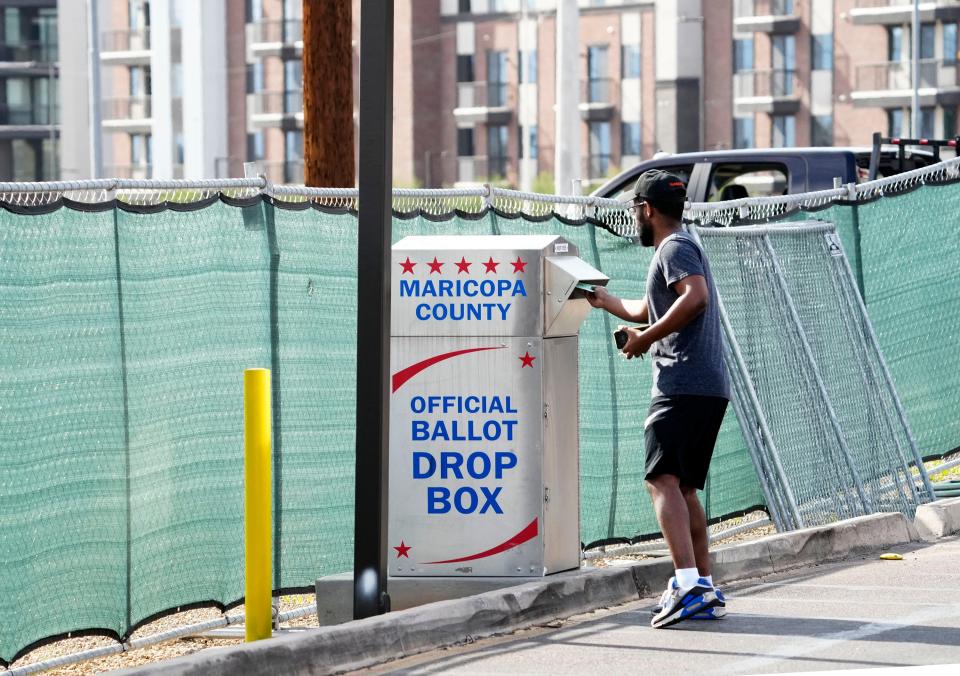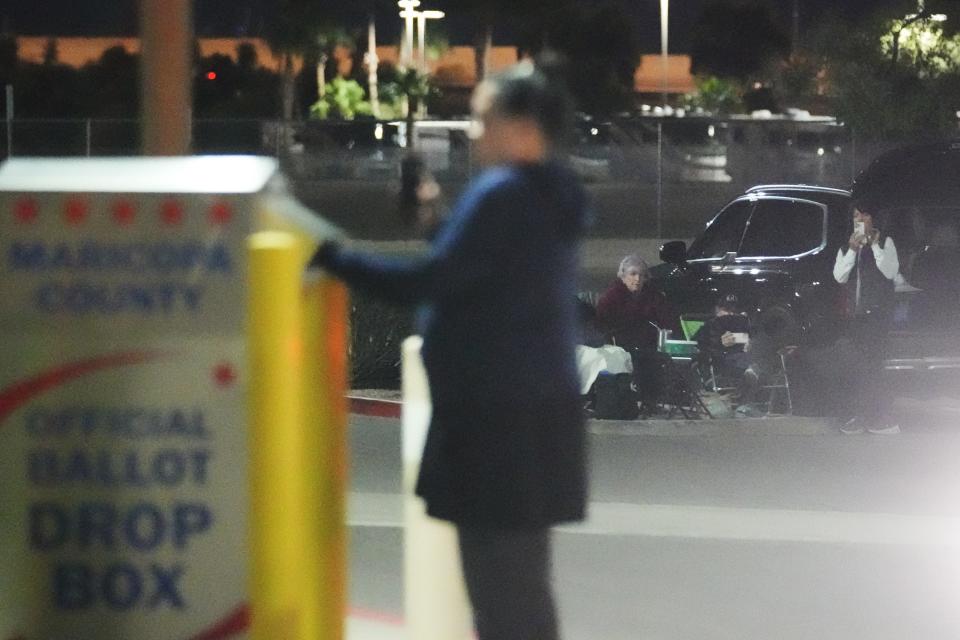A lawsuit seeks to ban unstaffed ballot drop boxes. How could that impact Arizona voters?
Elections officials from across Arizona say a new lawsuit to ban unstaffed ballot drop boxes could result in thousands in extra costs for counties and less accessibility for voters.
The suit, filed in Yavapai County this week by the Arizona Free Enterprise Club, alleges unmanned ballot drop boxes are illegal because there is no state statute specifically authorizing their use outside of established polling places. The conservative grassroots organization has challenged a variety of statewide voting practices in court.
The complaint questions whether Arizona Secretary of State Adrian Fontes can include rules for such drop boxes in his proposed Elections Procedures Manual. That's a document that instructs officials on how to comply with Arizona's election statutes, ensuring election practices are consistent statewide.
Drop boxes were first permitted statewide by the 2019 Elections Procedures Manual, Fontes said. That version of the rulebook remains in effect today and was approved by former Gov. Doug Ducey and former Attorney General Mark Brnovich, both Republicans.
Read the document: Arizona Free Enterprise Club v. Adrian Fontes
The suit points to a recent case in which the Wisconsin Supreme Court found unstaffed drop boxes weren't allowed under state law. It attacks the integrity of Arizona's drop boxes, even though Fontes and other election officials maintain that they are safe and secure.
Yavapai County's boxes each have different keys and include fire suppression mechanisms, said Chief Deputy Recorder Karen McCracken. Pinal County Recorder Dana Lewis said her drop boxes are GPS-tracked. In Maricopa County, they are equipped with tamper-proof tabs, said Recorder Stephen Richer.
All three of the counties said their drop boxes are under constant security camera surveillance and that bipartisan teams transport ballots from the boxes to election officials.
Fontes said the drop boxes are permissible, noting state law allows him to prescribe rules-setting procedures on early voting and ballot collection. In a statement, he pledged to "vigorously fight against any attempt to take away a voter’s right to use a ballot drop box."
Arizona Free Enterprise Club President Scot Mussi and longtime Republican attorney Tim LaSota, who is representing the group in the case, did not return The Arizona Republic's requests for comment on the suit.
How the suit could impact counties
Most Arizona counties offer at least a handful of ballot drop boxes.
Some are located inside polling places and are only accessible when those sites are open. Others are located outdoors and are available for voters at all times.
They are "very popular" with voters, McCracken said. Yavapai County, where voters overwhelmingly backed former President Donald Trump in the 2020 election, provides 19 of them.
"This is what voters want," said Pinal County Recorder Dana Lewis, who added that she is "dismayed" by the lawsuit. "It's not a Republican or Democratic thing."
Lewis said camera surveillance ensures her drop boxes are just as secure as they would be if her office paid workers to stand nearby and watch them. The cameras mean that she doesn't have to worry about her staff enduring Arizona's often brutal weather conditions, she said.
She and other officials also rebuffed the lawsuit's claim that ballot drop boxes are less secure than postal boxes that voters can use to mail back their ballots.
If the suit prevails, officials from various counties said they would likely need to staff outdoor drop boxes with bipartisan teams.
To staff boxes with two seasonal election workers at all hours throughout Arizona's maximum 27-day voting period, The Republic determined that Yavapai County could end up paying more than $465,000. In Pinal County, that number is about $175,000, and it totals about $35,000 for Maricopa County.
The costs vary based on how many outdoor drop boxes each county currently provides and how much election officials generally pay temporary workers.
Richer said he might consider closing Maricopa County's two outdoor drop boxes if he were required to staff them.
"I don't think it would be a great cost benefit," he said.

McCracken said it would be extremely difficult to staff her county's drop boxes at all times.
"It kind of boggles my mind that we would have to man them," she said. "I don't know that it could be a 24/7 operation. I don't really know how many people would want to be there after dark, outside in the elements."
Drop box monitors
The suit comes after groups of people surveilled drop boxes in Maricopa and Yavapai counties during the 2022 midterms.
The monitors — with lawn chairs, pizza, video cameras, and sometimes firearms — captured media attention and ultimately became one of the defining images of the election cycle.

Their activities resulted in scores of voter complaints to election officials and sparked a lawsuit in which a federal judge chose to grant an emergency order temporarily limiting observers' search for ballot "mules" and voting scofflaws.
The suit references those incidents, arguing that unstaffed drop boxes increase the possibility of voter intimidation.
Richer said he doesn't believe the lawsuit does anything to help protect election integrity.
Maricopa County elections 2023: What to know about the November city and school district elections
He wouldn't speculate on why the Arizona Free Enterprise Club might be bringing its lawsuit against ballot drop boxes or on the legal merits of the case. But Richer connected both last year's monitors and a general distrust of Arizona's drop boxes to the film "2,000 Mules."
That movie states, without proof, that widespread ballot harvesting occurred during the 2020 presidential election. Although the claim has been repeatedly debunked, its influence remains widespread.
"I think a lot of right-of-center groups feel an obligation to try to litigate wherever possible with respect to elections," Richer said. "I don't think that this does anything for the health of the process or for the integrity of the process."
On Tuesday, Gov. Katie Hobbs' Elections Task Force backed a proposal to provide some protection for voters who use ballot drop boxes. But the members stayed away from endorsing the use of drop boxes, noting any such effort was unlikely to get bipartisan support in the state Legislature.
Instead, the task force recommended that laws be amended to ensure that protections against voter intimidation and interference be applied to any method voters use to return their ballot.
Their recommendation acknowledged the problems with drop boxes in the 2022 elections and suggested a repeat is probable.
"Without any clear statutes expressly addressing activities near drop boxes, there is potential for escalation and increased tensions in future elections," the report stated.
Republic reporter Mary Jo Pitzl contributed to this article.
Sasha Hupka covers county government and election administration for The Arizona Republic. Do you have a tip to share on elections or voting? Reach her at sasha.hupka@arizonarepublic.com. Follow her on X, formerly Twitter: @SashaHupka. Follow her on Instagram or Threads: @sashahupkasnaps.
This article originally appeared on Arizona Republic: Suit to staff drop boxes could cost AZ counties, inhibit voter access

